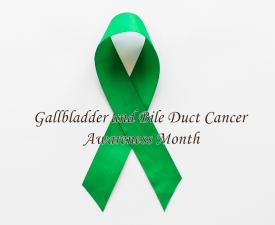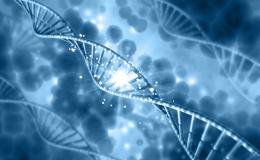What are the Signs and Symptoms of Gallbladder Cancer?
February 11, 2021
The gallbladder is a small, pear-shaped organ located below the liver that stores bile produced by the liver. Gallbladder cancers originate in the gallbladder and are very rare: In 2021, an estimated 11,980 new cases of gallbladder and bile duct cancer will be diagnosed in the United States.1

The disease causes few symptoms in the early stages, and the location of the organ, tucked below the liver, can cause a developing cancer to easily be overlooked. Because of this, gallbladder cancer is rarely diagnosed until more advanced stages, when symptoms begin to manifest and the disease prognosis is worse. In recognition of Gallbladder Cancer Awareness Month this February, we highlight the signs and symptoms of the disease, familial cases of the cancer, and actions you or someone you care about should take if you are experiencing symptoms consistent with gallbladder cancer.
Most gallbladder cancers are adenocarcinomas, which start in the glandular cells that line the inside of the gallbladder. Currently, screening tests for the cancer do not exist. Gallbladder cancers that are detected at early stages are typically diagnosed after the gallbladder has been removed due to gallstones. Signs and symptoms of more advanced stages of gallbladder cancer can include:
- Belly pain, typically in the upper right abdomen
- Nausea and/or vomiting
- Abdominal bloating
- Yellowing of the skin and whites of eyes (jaundice)
- Loss of appetite
- Unexplained weight loss
- Lumps in the abdomen
- Itchy skin
- Light-colored, greasy stools
If you or someone you care about is experiencing signs or symptoms consistent with the disease, it is important to see a doctor for evaluation.
Gallbladder cancer is rare, and to date, no gene mutations (changes) have been associated with an increased risk of developing the disease. Despite this, family members of a relative with gallbladder cancer have an increased risk of developing the same cancer. In 2003, a Swedish epidemiological study found a strong familial link in gallbladder cancers, where offspring of a parent diagnosed with gallbladder cancer were over 5 times more likely to develop the same cancer compared to the general population.2 This large, increased risk of offspring developing gallbladder cancer suggests that genetic factors likely play a role in familial cases of the disease.
Eventually, mutations in specific genes will likely be associated with an increased risk of developing gallbladder cancer, in much the same way other gene mutations have been implicated in other hereditary cancer syndromes. These inherited gene mutations typically impair a cell’s ability to control growth and division, and over time, enough additional gene mutations may allow a single cell to lose control of cell replication and divide uncontrollably. Comprehensive hereditary cancer screening can test a single patient for mutations in an entire panel of hereditary cancer genes to allow physicians to customize cancer screenings and other proactive measures based on each patient’s unique risks. To learn more about Kailos’ ExpedioTM Hereditary Cancer Risk Testing, click here, or contact us with any questions you may have regarding our genetic screenings.




